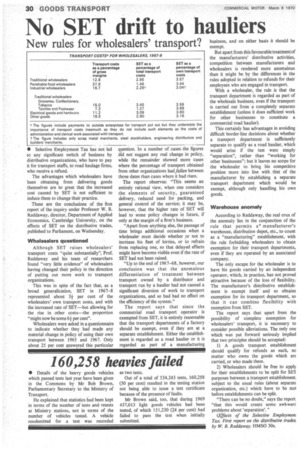No SET drift to hauliers
Page 32

If you've noticed an error in this article please click here to report it so we can fix it.
New rules for wholesalers' transport?
The figure's include payments to outside enterprises for transport put out but they understate the importance of transport costs inasmuch as they do not include such elements as the costs of administration and clerical work associated with transport.
t The figure includes only scrap metal merchants, steel stockholders, engineering distributors and builders' merchants.
• Selective Employment Tax has not led to any significant switch of business by distributive organizations, who have to pay it for transport staffs, to road haulage firms, who receive a refund. • The advantages which wholesalers have been obtaining from delivering goods themselves are in great that the increased cost caused by SET is not sufficient to induce them to change their practice.
These are the conclusions of the first report of the inquiry under Professor W. B. Reddaway, director, Department of Applied Economics, Cambridge University, on the effects of SET on the distributive trades, published to Parliament, on Wednesday.
Wholesalers questioned Although SET raises wholesalers' transport costs "quite substantially", Prof. Reddaway and his team of researchers found "very little evidence" of wholesalers having changed their policy in the direction of putting out more work to transport organizations.
This was in spite of the fact that, as a broad generalization, SET in 1967-8 represented about 3+ per cent of the wholesalers' own transport costs, and with the increased rate of SET—but allowing for the rise in other costs—the proportion "might now be some 6+ per cent".
Wholesalers were asked in a questionnaire to indicate whether they had made any material change in policy of using their own transport between 1965 and 1967. Only about 25 per cent answered this particular
question. In a number of cases. the figures did not suggest any real change in policy, while the remainder showed more cases where the percentage of transport obtained from other organizations had fallen between those dates than cases where it had risen.
The report observes: "This seems an entirely rational view, when one considers the elements of security, guaranteed delivery, reduced need for packing, and general control of the service; it may be, however, that the higher rate of SET will lead to some policy changes in future, if only at the margin of a firm's business.
"Apart from anything else, the passage of time brings additional occasions when a wholesaler must decide whether or not to increase his fleet of lorries, or to refrain from replacing one, so that delayed effects might have become visible even if the rate of SET had not been raised.
"Up to the end of 1967-68, however, our conclusion was that the anomalous differentiation of treatment between transport owned by a distributor and transport run by a haulier had not caused a significant diversion of work to transport organizations, and so had had no effect on the efficiency of the system."
The report says that since the commercial road transport operator is exempted from SET, it is entirely reasonable that the transport departments of a factory should be exempt, even if they are at a separate establishment. Either the establishment is regarded as a road haulier or it is regarded as part of a manufacturing




























































































































































